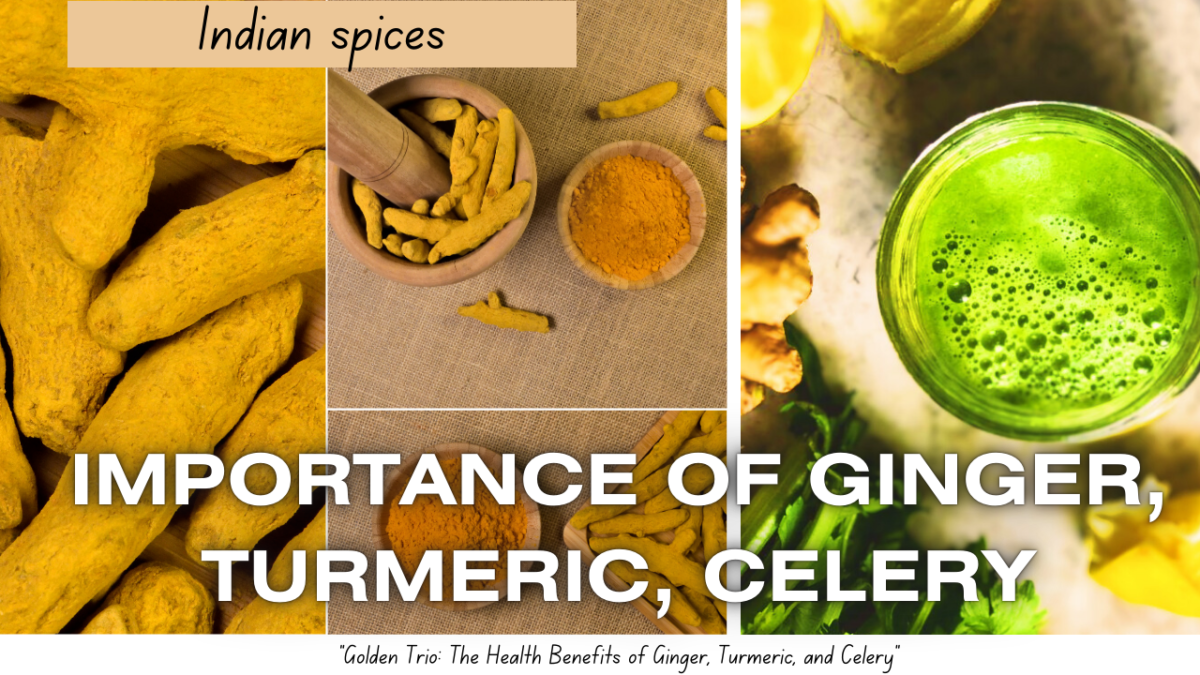Introduction
In the quest for better health, many turn to natural remedies and superfoods known for their potent health benefits. Among the most celebrated are turmeric, ginger, and celery. These three plants have been staples in traditional medicine for centuries and continue to be recognized for their healing properties. This article explores the health benefits of turmeric, ginger, and celery, highlighting their roles in promoting wellness.
Turmeric: The Golden Spice
Turmeric scientific name is curcuma lolnga Turmeric, often referred to as the golden spice, is renowned for its vibrant yellow color and powerful health benefits. It is a staple in Indian cuisine and traditional medicine.
Benefits
- Anti-inflammatory Properties: The active compound in turmeric, curcumin, has strong anti-inflammatory effects, making it beneficial for conditions like arthritis and inflammatory bowel disease.
- Antioxidant Powerhouse: Curcumin is a potent antioxidant that neutralizes free radicals and boosts the body’s own antioxidant enzymes.
- Improves Brain Function: Curcumin can increase brain-derived neurotrophic factor (BDNF), linked to improved brain function and a lower risk of brain diseases.
- Heart Health: Curcumin can improve the function of the endothelium, the lining of the blood vessels, helping to regulate blood pressure and reduce the risk of heart disease.
- Cancer Prevention: Some studies suggest that curcumin can reduce the growth of cancerous cells and inhibit the growth of new blood vessels in tumors.
Ginger: The Zesty Root
Ginger scientific name is Zingiber officinale Ginger is a popular spice with a long history of use in traditional medicine. It is known for its distinctive flavor and impressive health benefits.
Benefits
- Digestive Aid: Ginger helps stimulate saliva, bile, and gastric enzymes, aiding digestion. It is also effective against nausea and vomiting.
- Anti-inflammatory Effects: Ginger contains gingerol, a substance with powerful anti-inflammatory and antioxidant properties.
- Pain Relief: Studies suggest ginger can reduce muscle pain and soreness, making it beneficial for athletes and individuals with chronic pain.
- Lowers Blood Sugar: Ginger has been shown to lower blood sugar levels and improve various heart disease risk factors in people with type 2 diabetes.
- Anti-microbial and Anti-viral: Ginger has potent antimicrobial properties that can help combat infections and boost immunity.
Celery: The Crunchy Powerhouse
Celery scientific name is Apium graveolens Celery is a low-calorie vegetable known for its high water content and rich supply of nutrients. It has been used in traditional medicine for its various health benefits.
Benefits
- Rich in Nutrients: Celery is packed with vitamins and minerals, including vitamin K, vitamin C, potassium, and folate, essential for overall health.
- Supports Digestion: The high fiber content in celery aids in maintaining a healthy digestive system and preventing constipation.
- Anti-inflammatory: Celery contains antioxidants and polysaccharides that have anti-inflammatory properties, beneficial for conditions like arthritis.
- Heart Health: Compounds in celery help lower blood pressure, reduce cholesterol levels, and improve heart health.
- Hydration: With its high water content, celery is excellent for hydration and maintaining healthy skin.
Conclusion
Turmeric, ginger, and celery are more than just flavorful additions to your diet; they are powerhouses of health benefits. Incorporating these natural wonders into your daily routine can lead to significant improvements in your overall well-being. From reducing inflammation and pain to enhancing digestion and heart health, these superfoods are a testament to the healing power of nature.
Incorporating these natural ingredients into your diet is simple and can lead to a healthier, more balanced lifestyle. Whether enjoyed in meals, teas, or as supplements, turmeric, ginger, and celery offer a wealth of benefits that are hard to ignore.
Related posts
Subscribe
* You will receive the latest news and updates on your favorite celebrities!

